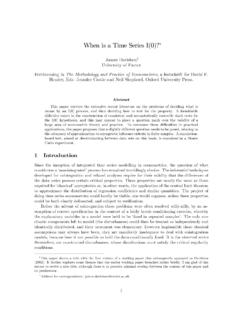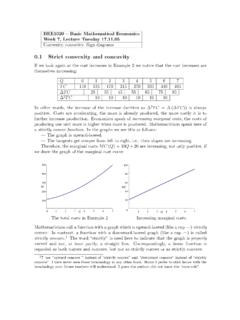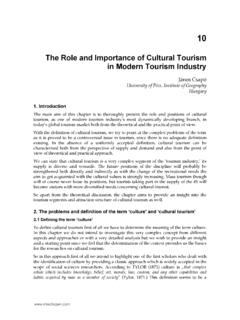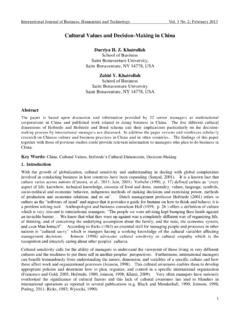Transcription of Cultural Values and International Differences in Business ...
1 Cultural Values and International Differences in Business EthicsAuthor(s): Bert Scholtens and Lammertjan DamReviewed work(s):Source: Journal of Business Ethics, Vol. 75, No. 3 (Oct., 2007), pp. 273-284 Published by: SpringerStable URL: .Accessed: 12/02/2013 17:25 Your use of the JSTOR archive indicates your acceptance of the Terms & Conditions of Use, available at ..JSTOR is a not-for-profit service that helps scholars, researchers, and students discover, use, and build upon a wide range ofcontent in a trusted digital archive. We use information technology and tools to increase productivity and facilitate new formsof scholarship.
2 For more information about JSTOR, please contact .Springer is collaborating with JSTOR to digitize, preserve and extend access to Journal of Business This content downloaded on Tue, 12 Feb 2013 17:25:54 PMAll use subject to JSTOR Terms and ConditionsJournal of Business Ethics (2007) 75:273-284 DOI Cultural Values and International Differences in Business Ethics ? Springer 2007 Bert Scholtens Lammertjan Dam ABSTRACT. We analyze ethical poUcies of firms in industriaUzed countries and try to find out whether cul ture is a factor that plays a significant role in explaining country Differences .
3 We look into the firm's human rights policy, its governance of bribery and corruption, and the comprehensiveness, implementation and communication of its codes of ethics. We use a dataset on ethical policies of almost 2,700 firms in 24 countries. We find that there are significant Differences among ethical policies of firms headquartered in different countries. When we associate these ethical policies with Hofstede's Cultural indicators, we find that individuaUsm and uncertainty avoidance are positively associated with a firm's ethical policies, whereas masculinity and power distance are negatively related to these policies.
4 KEYWORDS: Business ethics, codes of ethics, Cultural Values JEL: G300, L210, MHO Introduction Are there Differences with respect to the ethical policies of firms that are headquartered in different countries? And are there Differences among firms that belong to different industries? Chryssides and Bert Scholtens received his at the Universtiy of Amsterdam. Since 1999 he has been working at the Department of Finance of the University of Groningen, the Netherlands. His research particularly looks into the inter action between financial institutions and corporate social responsibility.
5 He has published in, among others, Ecolo gical Economics, Journal of Banking and Finance, Finance Letters, Journal of Investing, Sustainable Development, and Journal of Business Ethics. Lammertjan Dam is a student at the Universtiy if Groningen. He expects to defend his thesis about the in tegration of corporate social responsibility in economic valua tion in Summer 2001. Kaler (1996), FerreU et al. (2000), and Crane and Matten (2004) discuss that the conduct of Business emerges and evolves in response to religious, philosophical, societal, economical, and institutional concepts and notions.
6 They also point out that ethical theories can help to clarify the different moral presuppositions of the various parties involved in a decision or action ( Chapter 3 in Crane and Matten, 2004). As such, ethical theories are being applied to Business ethics (see also De George, 1999; FerreU et al., 2000). Then, we find that Business ethics, as part of culture, does not happen in vacuum or isolation. It takes place in a social and Cultural environment that is being governed by a complex set of laws, rules and regulations, formal Values and norms, codes of conduct, policies, and various organizations (see Hofstede, 1991; Scott, 2001; Trompenaars, 1993).
7 Ethical theories can be used to analyze the (changes in) ethics and ethical poHcies of Business in time and among countries and industries. Berkert (1995) contends that corporations differ from individual agents with respect to their suscep tibility for moral responsibilities. In his view, it is a special set of Values , principles and ideas which regulates behavior in Business . As ethical conduct of individuals and organizations is part of and very much intertwined with culture and society, it is quite common to assume that the ethics of firm behavior too wiU be subject to change (see also Mclnnes, 1996).
8 While various explanations have been offered to explain these societal Differences , an ever-growing body of Hterature argues that Cultural Differences between countries are one of the main drivers of a nation's level of economic and entre preneurial conduct (McGrath et al., 1992; Thomas and MueUer, 2000). Recognizing the critical role that culture plays in determining corporate behavior, several scholars have caUed for future research This content downloaded on Tue, 12 Feb 2013 17:25:54 PMAll use subject to JSTOR Terms and Conditions274 Bert Scholtens and Lammertjan Dam addressing the impact of national culture on corpo rate activity.
9 For example, Sethi and Sama (1998) argue that in order to investigate ethical Business conduct, both corporate and industry structure has to be considered (see also Zahra et al., 1999). They assess industry sectors on the basis of their structural and institutional opportunities towards exploitation. However, they do not test their framework. Thus, it is not clear how culture is related to the ethical conduct of firms in practice. Fortunately, much empirical research in this direction already has been undertaken. For example, in an empirical study after the adoption of voluntary codes of conduct, Bondy et al.
10 (2004) find that there are significant Differences between the UK, Ger many, and Canada. Sanyal (2005) finds bribery differs significantly among countries and that it is both economic and Cultural factors that are important explanatory factors of bribery. Many studies focus on particular aspects of ethical codes or on the use of codes in specific industries. For example, Koehn (2005) treats integrity of the firm as an important Business asset (see also Pearson (1995) for a simUar approach). DiUer (1999) focuses on the improvement of customer relationships.

















